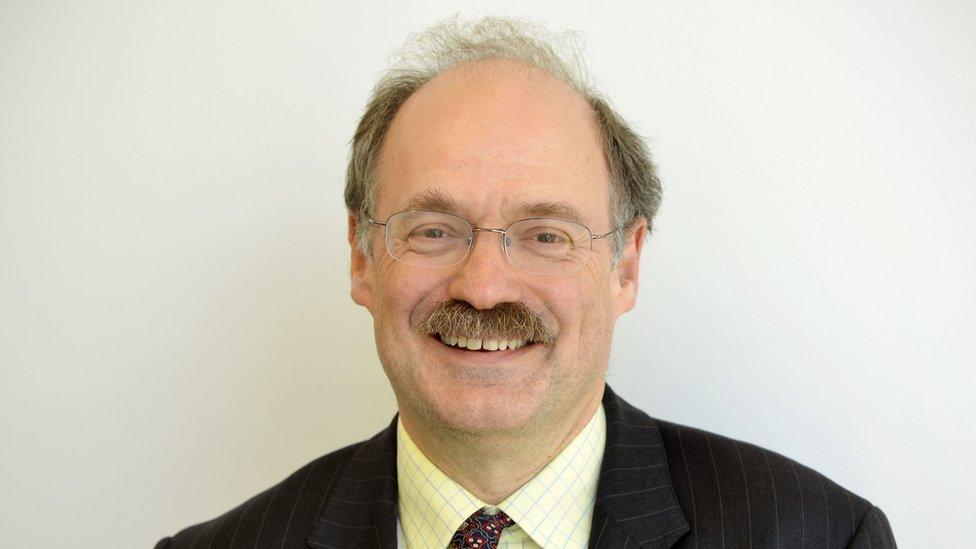New UK research body appoints chief
- Published

Prof Walport is currently the UK's chief scientific adviser
Prof Sir Mark Walport has been appointed to head Britain's newly created research funding organisation.
He will be the first chief executive of UK Research and Innovation (UKRI) - an umbrella body that will oversee the distribution of £6bn of research funding annually.
Sir Mark, external is currently the government's chief scientific adviser.
At the moment, UK research is funded by nine separate organisations. Each body specialises in specific fields.
The system is regarded as one that works well and has contributed to Britain leading the world in many areas of science.
The government is replacing it with UKRI, which will oversee and co-ordinate the work of the research organisations, following a review of the system by Prof Sir Paul Nurse. Prof Walport will be its chief executive when it takes control on 1 April, 2018, just as his term as chief scientist finishes.
Critics of the reform fear that the restructuring is a merger in all but name.
Research push-back
It would, they believe, lead to the loss of the close relationships between specialist funding bodies and research groups that has led to a system of effective funding that nurtures world class research.
Before he was appointed chief scientific adviser in 2012, Prof Walport was director of the Wellcome Trust - one of the largest funders of medical research in the world.
This, combined with his extensive experience of government, make him highly qualified to take on the new post.
In a statement Sir Mark said: "I am honoured to be appointed as the first chief executive of UKRI. My ambition is to make UKRI the world's leading research and innovation public funding agency.
"I look forward to working closely with the Research Councils, Innovate UK and Higher Education Funding Council for England (HEFCE), as we work together to create UKRI. I also look forward to working closely with all of our research and innovation communities to provide a strong and coherent voice for UK science and innovation."
But his appointment is controversial. Critics fear his leadership style will lead to a more centralised approach to research and to a diminishing role for the individual research councils.
'All powerful'
Prof Walport has a reputation for being tough. He has steered through controversial strategic changes at the Wellcome Trust that have won him many friends but also some enemies.
The new head of UKRI also has strong opinions on a variety of issues and is not shy to express them, often forcefully.
The Astronomer Royal Lord Rees told BBC News: "Reorganisation of the research councils puts a great deal of power in the hands of a single person. They oversee such a great deal of research, ranging from hard science at one end to humanities at the other. No-one could fulfil the role adequately."
James Wilsdon, professor of research policy at the University of Sheffield, said his appointment would be greeted with mixed feelings.
"Sir Mark Walport is the ultimate operator in British science, so his appointment as UKRI's CEO is in some ways an unsurprising outcome. He will bring a wealth of experience to the role, both from his years running the Wellcome Trust, and from the past four years he's spent as government chief scientific adviser," he said.
"The vision for UKRI is ambitious and exciting, and Mark's track record and connections will be a huge asset in turning this into an operational reality.
"But as he will be only too aware, critics in the House of Lords and elsewhere, who fear that UKRI may lead to greater centralisation of power and political direction across the research system, will also be looking to Mark for reassurance that the opportunities of UKRI can be realised, whilst still preserving the delicate balance between freedom and accountability - bottom-up and top-down - that has enabled UK research to flourish."
'Good chaos'
The Science Minister, Jo Johnson MP, confirm the news in a tweet: "With Sir John Kingman as Chairman and Sir Mark Walport as CEO, UKRI will be a strong voice for science and innovation."
Venki Ramakrishnan, president of the Royal Society, also welcomed the appointment: "Sir Mark Walport's appointment as CEO of UK Research and Innovation is excellent news. Mark's broad experience leading the Wellcome Trust and as Chief Scientific Advisor to the Government will serve him well as UKRI establishes itself as a strong and unified voice for science that can help tackle the considerable challenges that lie ahead, both national and global."
But the Nobel Prize winner cautioned against any attempt to centralise control of how research funds are allocated: "Sir Mark should also be well placed to address the concerns of the science community about ensuring that establishing UKRI causes minimal disruption to an already highly efficient research ecosystem and protects the autonomy of the individual Research Councils."
Ehsan Masood, the editor of Research Professional News, which covers science policy, said he believed that the strength of the UK's research system is that it is slightly chaotic, and decisions about what to fund and how much to spend are devolved to those who are closest to the people doing the research.
"The big worry is Sir Mark's appointment will change that. When UKRI becomes an arm of the government - that creates an extra barrier for individual scientists who want to heard."
Follow Pallab on Twitter., external